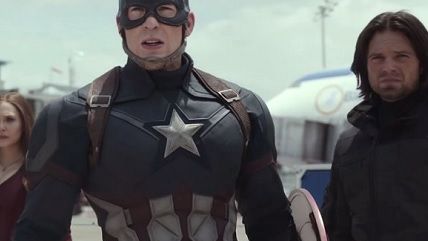Captain American Exceptionalism
Civil War's political divide pits unilateralism vs. multilateralism but still takes a back seat to personal loyalties

If there's a dividing line between art and entertainment, a good candidate for it is whether there can be competing interpretations—art is open to them while "mere" entertainment isn't. And if that's the case, then despite all the complaints coming from critics grown weary of reviewing them, the best of Marvel Studios' superhero movies certainly qualify as art.
That's no less the case with one of the best-reviewed of the bunch to date, Captain America: Civil War. That said, not all interpretations are created equal. And so we have Amanda Marcotte writing in Salon and doing what Salon writers seem contractually bound to do: burn straw men.
"Steve [Rogers, aka Captain America] suddenly turns from a level-headed liberal to a Ayn Randian libertarian douchebag who throws tantrums because he has to do grown-up stuff like share power instead of make unilateral decisions for other people," Marcotte complains. "It was a betrayal of the character and made the movie less fun than it should have been."
One could chide Marcotte for her limited knowledge of Captain America, who, since the 1970s, has spent nearly as much time going against the U.S. government as working for it.
I've lost count of the number of times he's turned in his shield or even gone so far as to assume a completely new identity. But why resort to comic book esoterica when there's plenty of evidence to contradict Marcotte right up on the movie screen?
Cap's big libertarian moment comes not in Civil War, but in the franchise's previous installment, Captain America: The Winter Soldier. It happens early on, when he confronts SHIELD Director Nick Fury about Project Insight, which combines the worst of ubiquitous surveillance and the worst of drone warfare. And that happens when Cap still thinks of SHIELD as the good guys—before he and the audience find out the organization is shot through with villainous HYDRA agents.
If there's a lesson here for a democracy, it's that you can't give Barack Obama unlimited surveillance and assassination power without giving the next Republican that power, too, and that next Republican might be Donald Trump.
But Marcotte characterizes this as Cap being a good liberal and being concerned with privacy and oversight by democratic institutions, as if those institutions are not just as much in question. But Cap's disagreement with Fury goes well beyond that.
"This isn't freedom," Cap tells Fury. "This is fear."
Sure, plenty of liberals are concerned about overreaching surveillance and disdain stoking fear of terrorism for political gain, but then there's Sen. Dianne Feinstein, the liberal California Democrat who never saw a surveillance program that went too far until she found out the CIA was spying on her.
If you want to talk about the politics of Marvel's superhero movies, you need to keep in mind the actual political context in which they're made—not some fairytale version in which liberal Democrats—and democratic institutions and oversight panels—have an unblemished record on civil liberties. This is not The West Wing.
Beides, if there has been a Randian among the Avengers, it has, up until Civil War, been Iron Man. Tony Stark's testimony before a Senate committee in Iron Man 2 and his insistence on keeping control of the armor technology he created could have come out of the mouth of one of Ayn Rand's heroes—if any of Rand's heroes were capable of humor or sarcasm, which they're not. And Stark at that point wasn't out to make "unilateral decisions for other people"; he wanted mostly to make decisions about and for himself.
In any case, seeing Steve Rogers in Civil War as a libertarian is only one possible reading. It's just as easy—easier perhaps—to view the conflict between Rogers and Stark as pitting conservative unilateralism vs. conservative multilateralism.
The main charge leveled at the Avengers in Civil War is they act unilaterally, without regard to national sovereignty, and too often leaving behind collateral damage. That could easily be read as a libertarian critique of neoconservative foreign policy, especially when we learn all the events of Civil War qualify as blowback from the Avengers' actions in Avengers: Age of Ultron.
Against this, a chastised Stark, comes down in favor of multilateralism, even if that means going through a decidedly less-than-ideal mechanism such as the United Nations, which Stark clearly hints can be gamed, anyway.
The ideological divide in Civil War may not be all that large. It may stretch just from neoconservative unilateralism to realist-conservative multilateralism.
With that small an ideological chasm between our heroes, it's no wonder the main conflicts of Captain America: Civil War come down not to political differences but personal ones, with Cap's old pal Bucky Barnes (aka the Winter Soldier) at the center of it all.
Ultimately, the personal is not the political.


Show Comments (80)